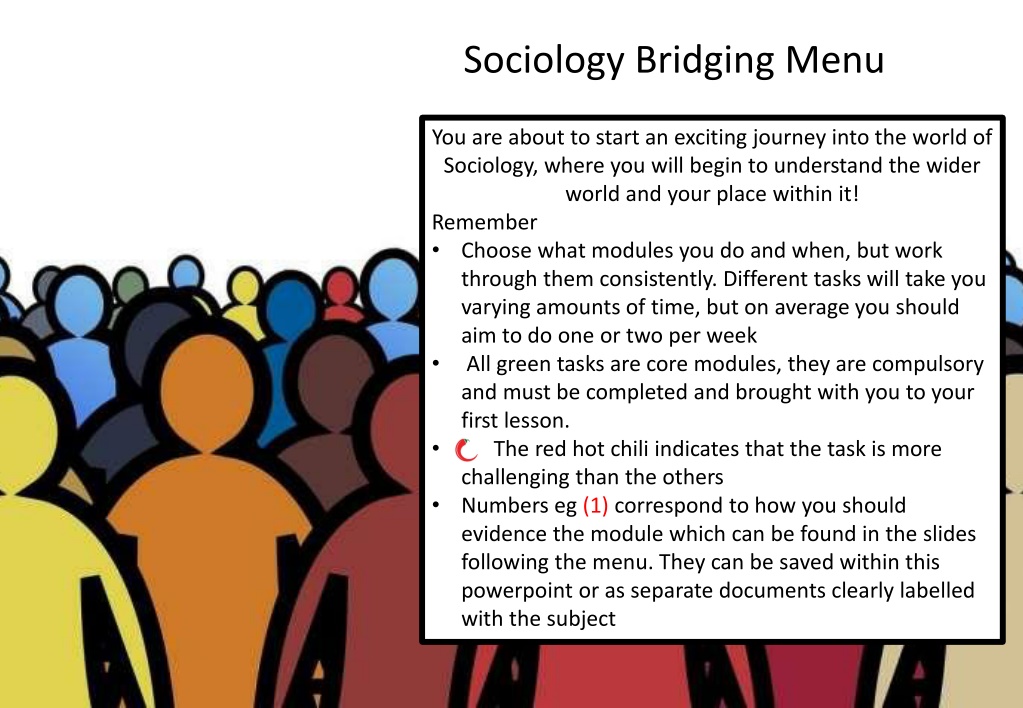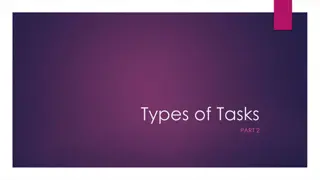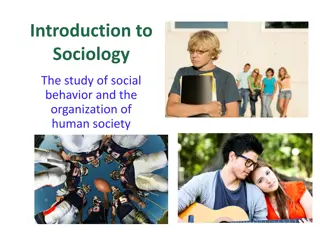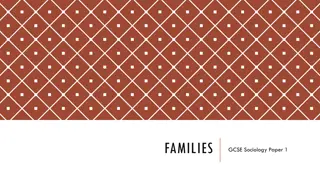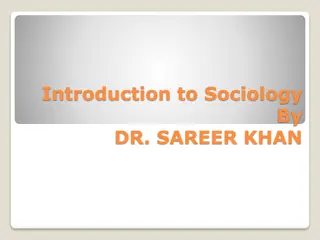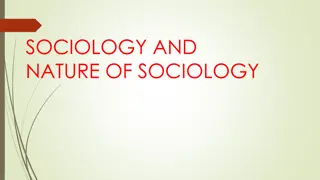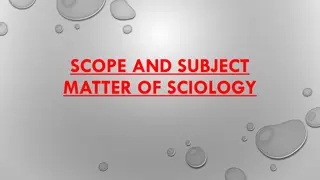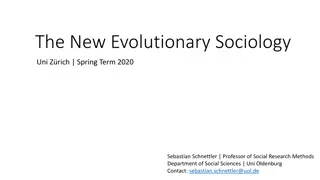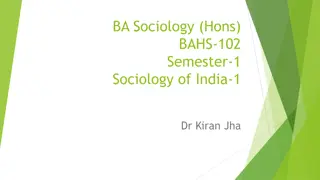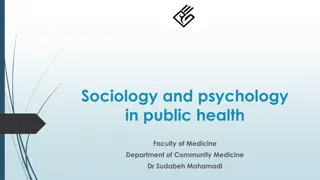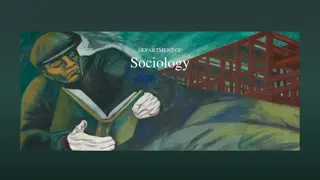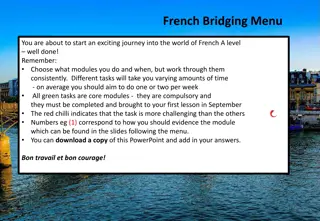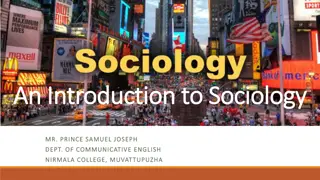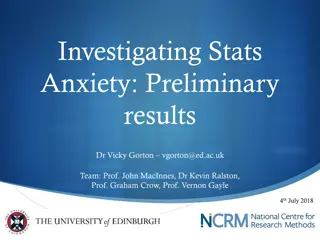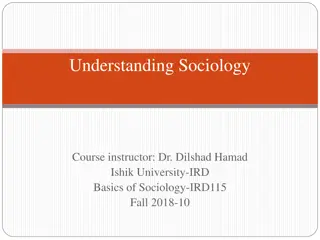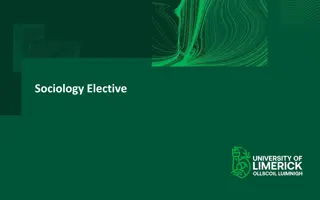Exciting Journey into Sociology: Modules, Tasks, and Exploration
Dive into the world of Sociology with core modules, challenging tasks, and diverse explorations. From understanding culture and society to exploring identity and theories, this journey offers a wide range of topics to delve into. Engage with educational resources, visit museums, complete transition booklets, and more as you navigate through the intriguing landscapes of sociology. Embrace the opportunity to reflect on societal issues, educational systems, gender equality, and the impact of identities. This enriching experience promises to broaden your perspective and deepen your understanding of the social world.
Download Presentation

Please find below an Image/Link to download the presentation.
The content on the website is provided AS IS for your information and personal use only. It may not be sold, licensed, or shared on other websites without obtaining consent from the author. Download presentation by click this link. If you encounter any issues during the download, it is possible that the publisher has removed the file from their server.
E N D
Presentation Transcript
Sociology Bridging Menu You are about to start an exciting journey into the world of Sociology, where you will begin to understand the wider world and your place within it! Remember Choose what modules you do and when, but work through them consistently. Different tasks will take you varying amounts of time, but on average you should aim to do one or two per week All green tasks are core modules, they are compulsory and must be completed and brought with you to your first lesson. The red hot chili indicates that the task is more challenging than the others Numbers eg (1) correspond to how you should evidence the module which can be found in the slides following the menu. They can be saved within this powerpoint or as separate documents clearly labelled with the subject
Sociology Bridging Menu (Green modules are core (compulsory) modules , indicates the most challenging modules ) Read Watch Listen Visit Do (virtually or physically at a later date) Culture and Society A general introduction to the concepts of culture and society that looks the question What is society?, the nature of social organisation and the relationship between culture and instinct (1) Harrow a very British education Explore what it is like to attend a private school and consider how this advantages/disadvantages students in their education (1) The class ceiling: Thinking Allowed (1) Museum of Childhood (7) Open Learn: Identity in question Why is identity important and how are identities formed? This free course, Identity in question, looks at the many different ways in which identity can be categorised. By examining the requirements of the state, how a child views gender, and the importance of race or place of birth, you will start to understand how each individual can have more than one identity. (4) Everyday Sexism After experiencing a series of escalating sexist incidents, Laura Bates started the everyday sexism project and has gone on to write 'a pioneering analysis of modern day misogyny . (1) Kids behind bars Post-truth: Thinking Allowed Virtual LSE Open Day (5) Transition Booklet Complete the activities in the transition booklet (2) Exploire the impact of a criminal record on the life chances for young people and the sociological factors that have led to them committing crime (1) (1) Choose one of the Sociological Theories listed below Research and produce a presentation which covers: The key points of the theory The main thinkers and what they say How the theory can be applied to everyday life Any criticisms of your chosen theory The madness of crowds In his devastating new book The Madness of Crowds, Douglas Murray examines the twenty-first century's most divisive issues: sexuality, gender, technology and race. (1) Identity: Thinking Allowed (1) The Old Bailey (1) 1984 Hidden away in the Record Department of the sprawling Ministry of Truth, Winston Smith skilfully rewrites the past to suit the needs of the Party. Yet he inwardly rebels against the totalitarian world he lives in, which demands absolute obedience and controls him through the all-seeing telescreens and the watchful eye of Big TED Talks (1) Why gender equality is good for everyone even men The boost students need to overcome obstacles Gangs and Spirituality: Thinking Allowed (1) Sociological Theories: Marxism Functionalism Feminism New Right Postmodernism (3) LSE Public Lectures (1)
(1) - Book/Journal/Podcast/Film Review Would you/would you not recommend it? Why? Rating: Review by: ___________________________________________ Title: _______________________________________________________ Author: ____________________________________________________ Review of (please circle) Book Journal Podcast Film Documentary What was it about? What did you find particularly interesting/inspiring/shocking? Has this changed your opinion? How does it link to this subject and why is it important? What would you like to learn more about? Save your answers as part of this PowerPoint & copy the template as many times as you need
Transition Booklet (2) Complete the activities in the transition booklet and bring a printed copy with you to your first lesson
(3) Research presentation: Sociological Theories Do this as a PowerPoint presentation that covers each of the points below: The key points of the theory The main thinkers and what they say How the theory can be applied to everyday life Any criticisms of your chosen theory Add the notes you would say in the notes section beneath each slide so that each slide just shows the key concise points
OpenLearn: What do we mean by family ? (4) To evidence this you can Save any notes you take Take and save a screenshot of completed modules or the completed course Download the course completion certificate.
Virtual LSE Sociology Department Open Day (5) 1. 2. 3. 4. 5. 6. 7. How many students are in the Sociology Department in total? How many teaching staff are there? What are some of the core areas of teaching? What are the typical entry requirements? What does the course structure look like? How are students assessed? What sort of work do students go on to in the future?
(6) Visit the Museum of Childhood/The Old Bailey Choose whether you would like to make (to summarise the attraction and/or your visit if possible): A podcast An informative flyer A mini film A report A newspaper article
